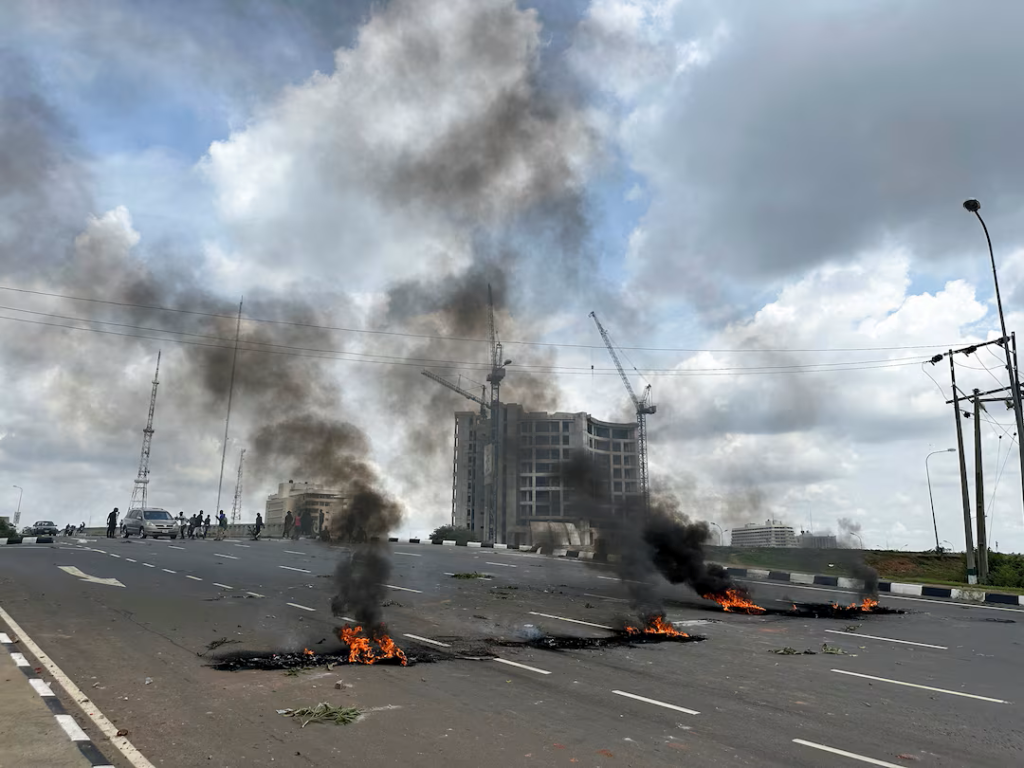In Summary
• At least three people dead as protests turn violent in major Nigerian cities
• Police placed on red alert, military assistance may be sought
• Curfews imposed in Kano and three other states
• Protests expected to continue against economic reforms and hardship
ABUJA, NIERGIA- Nigeria finds itself at a tipping point as nationwide protests against economic hardship have escalated into violence, prompting a heightened security response and raising concerns about potential military intervention.
The Inspector General of Nigerian Police, Kayode Egbetokun, announced late Thursday that law enforcement has been placed on red alert following clashes that left at least three people dead.
The unrest, which began as part of the “#EndBadGovernanceInNigeria” movement inspired by recent youth-led protests in Kenya, has spread to major cities across the country. Demonstrators are voicing their frustration with President Bola Tinubu’s economic reforms, which have led to skyrocketing inflation, a weakened currency, and increased hardship for ordinary Nigerians.
In response to the escalating situation, Inspector General Egbetokun stated, “The Police is equipped to respond appropriately to the unfolding situation and will get assistance from other security agencies, including the military if the need arises.” This statement underscores the gravity of the situation and the government’s readiness to employ all available resources to maintain order.
The northern city of Kano, one of Nigeria’s most populous states, became a flashpoint of violence on Thursday. Protesters looted a shop and a government complex, prompting authorities to impose a 24-hour curfew. Similar measures have been implemented in parts of three other states as officials attempt to curb the spread of unrest.
As of early Friday, major cities including the capital Abuja and Kano appeared relatively calm. However, tensions remain high as protesters have vowed to continue their demonstrations for a total of 10 days. The movement, which began as an online campaign, has rapidly evolved into a significant challenge to President Tinubu’s administration.
At the heart of the protests are the economic reforms introduced by Tinubu, which include the removal of fuel subsidies and currency liberalization. While the President maintains that these measures are necessary for long-term economic growth, their immediate impact has been severe for many Nigerians. Tinubu has acknowledged the pain caused by the reforms but insists they are the only path to sustainable economic development.
The situation in Nigeria echoes recent events in Kenya, where youth-led protests forced the government to abandon new taxes. However, the Nigerian context presents unique challenges, given the country’s complex regional dynamics and history of military involvement in civilian affairs.
As the nation braces for potential further unrest, the international community watches closely. The government’s response to these protests will be crucial in determining Nigeria’s path forward, balancing the need for economic reform with the immediate welfare of its citizens.
The coming days will be critical as authorities attempt to manage the ongoing demonstrations while addressing the underlying economic grievances that have brought thousands to the streets. With the police on high alert and the possibility of military involvement looming, Nigeria stands at a crossroads, facing a test of its democratic institutions and the resilience of its people.
https://www.africanexponent.com/nigeria-on-edge-police-on-red-alert-as-protests-turn-deadly-military-assistance-possible/


